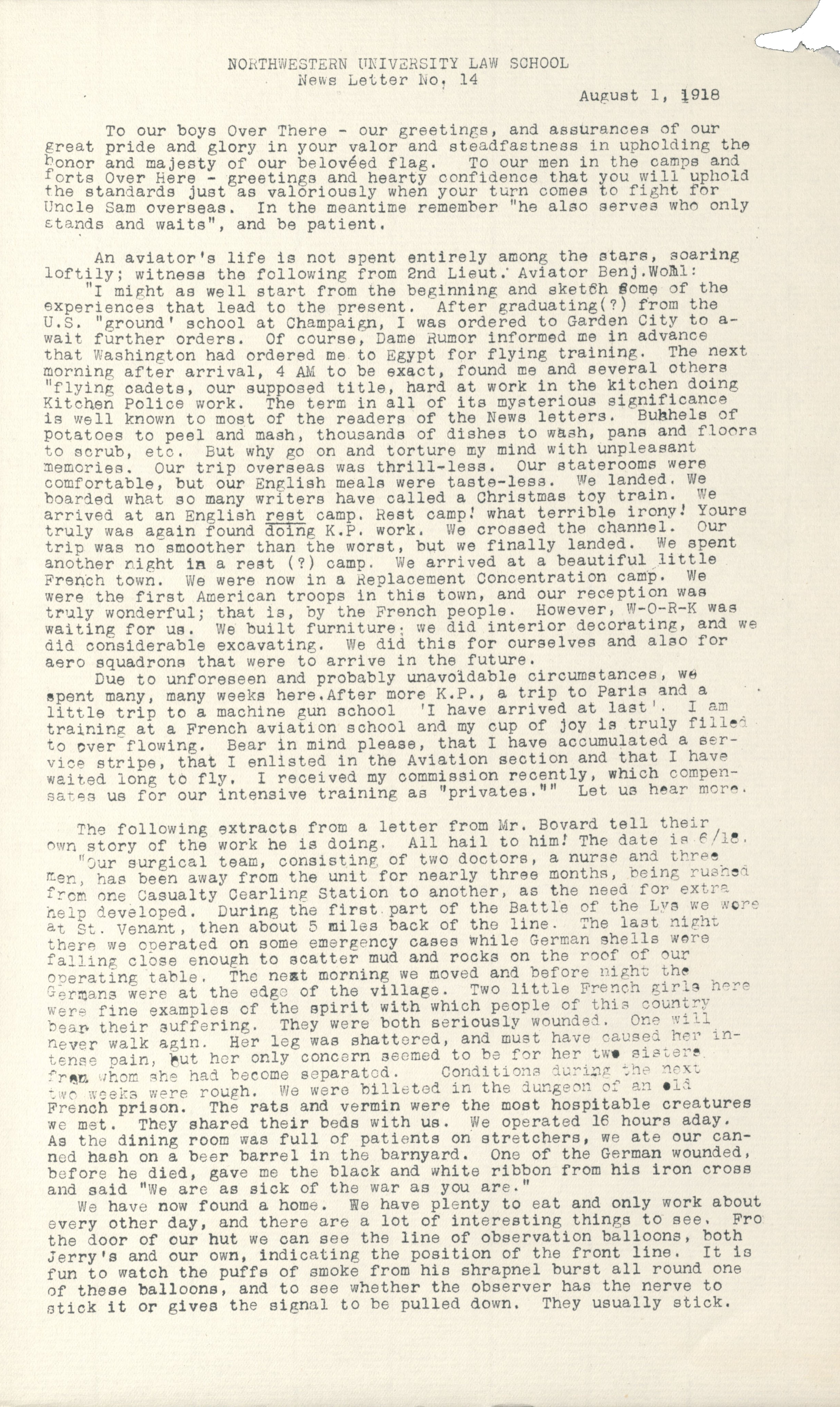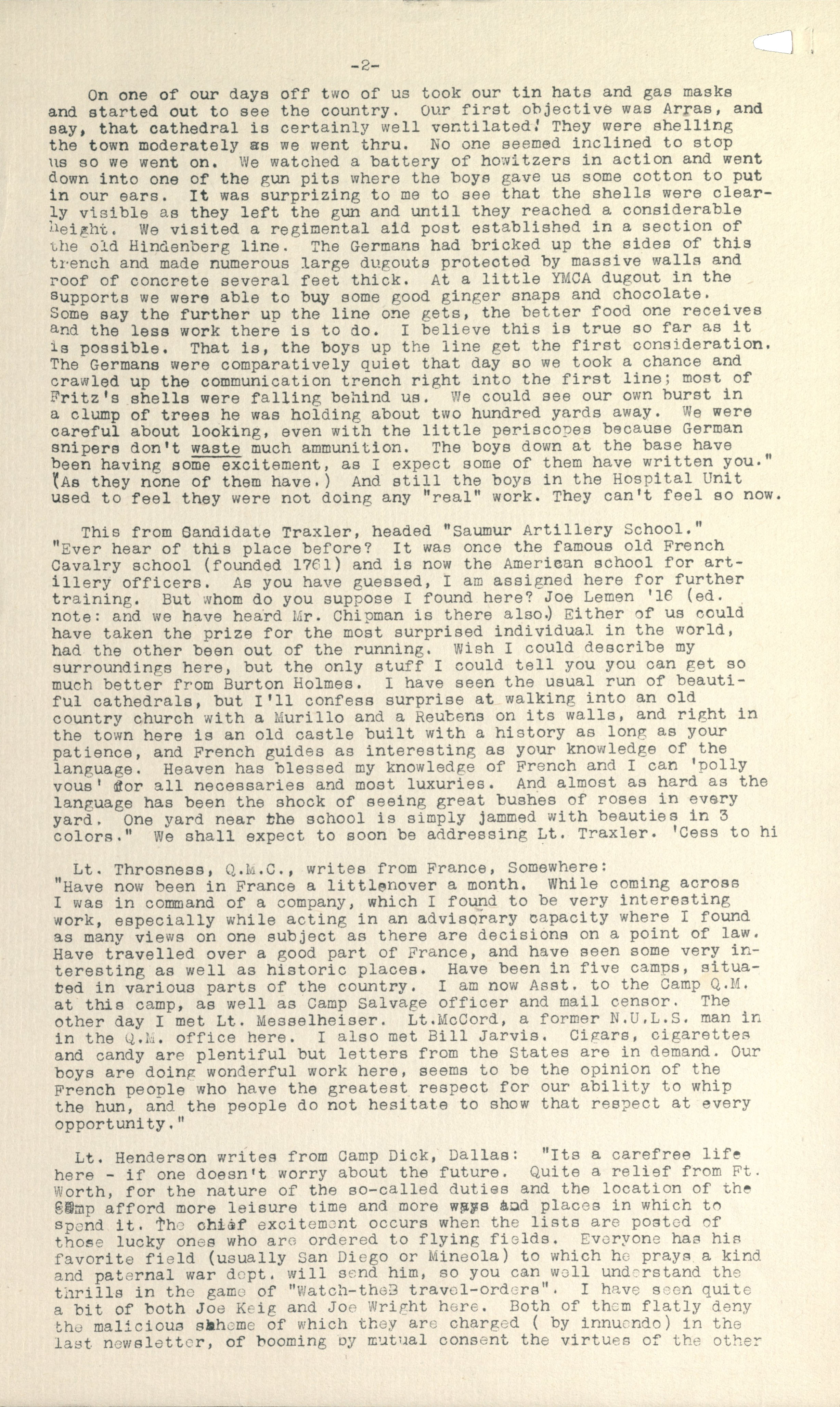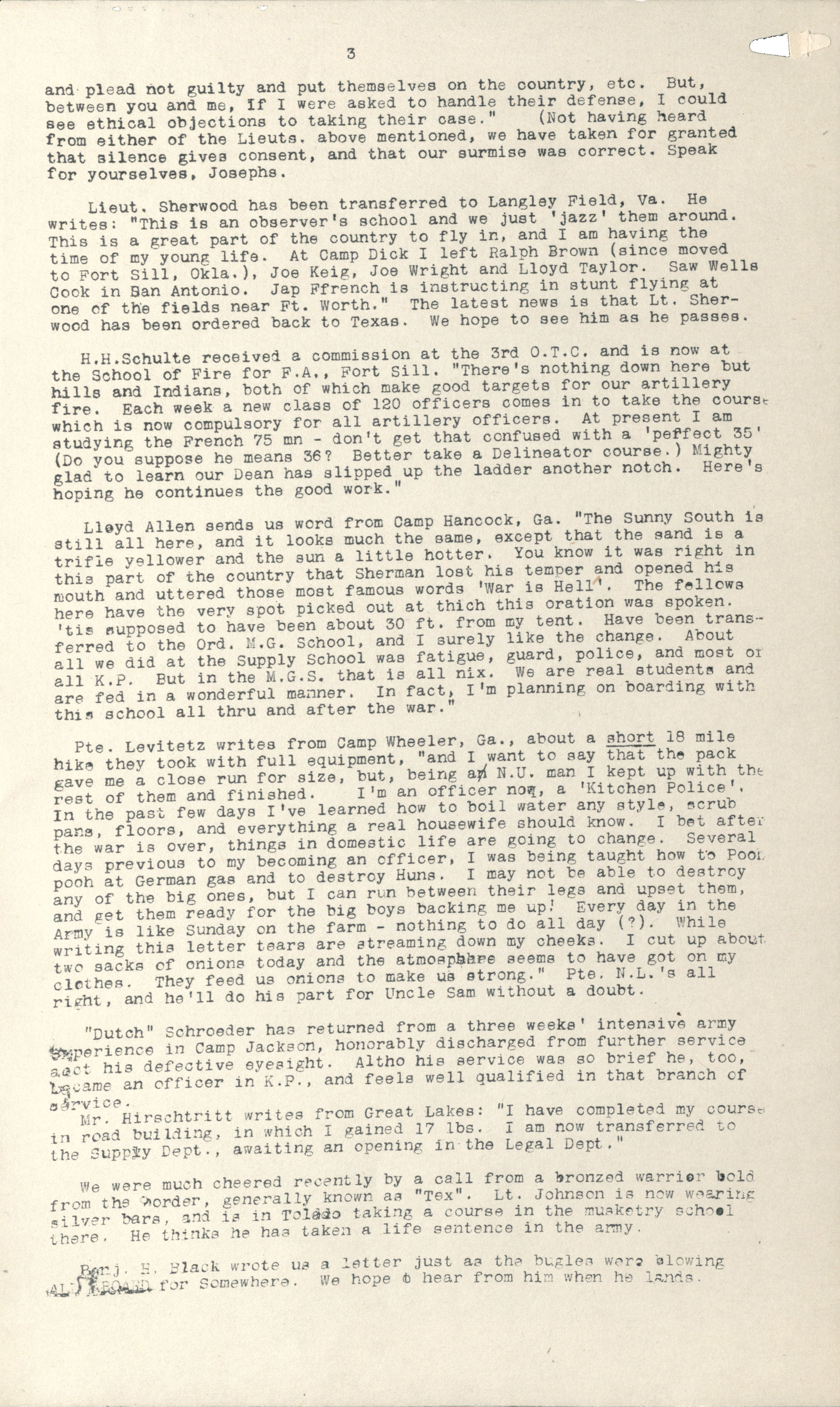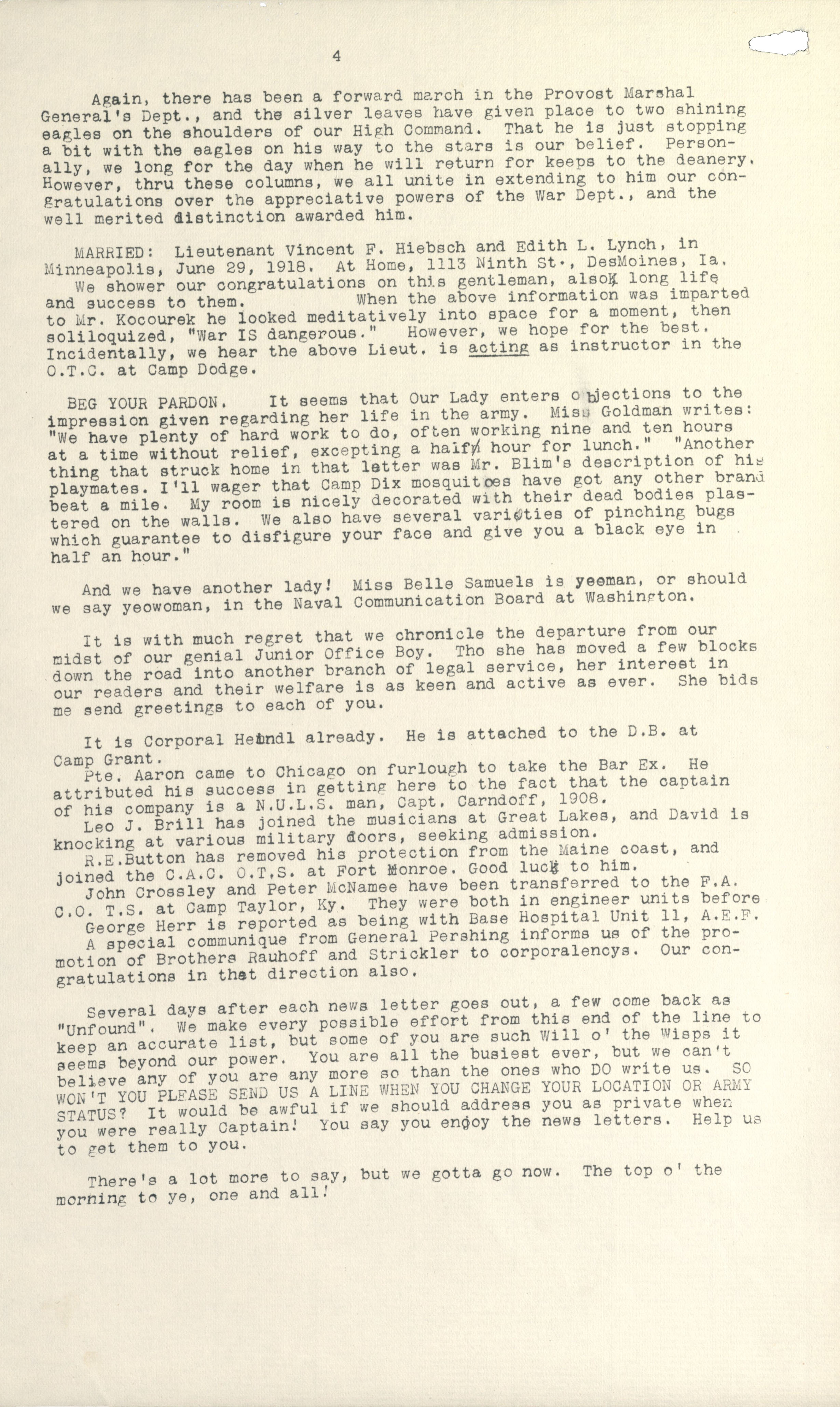Transcription of the Soldiers' Newsletter, 1 August 1918
NORTHWESTERN LAW SCHOOL
News Letter No. 14
August 1, 1918
To our boys Over There – our greetings, and assurances of our great pride and glory in your valor and steadfastness in upholding the honor and majesty of our belovéed flag. To our men in the camps and forts Over Here – greetings and hearty confidence that you will uphold the standards just as valoriously when your turn comes to fight for Uncle Sam overseas. In the meantime remember “he also serves who only stands and waits”, and be patient.
An aviator’s life is not spent entirely among the stars, soaring loftily: witness the following from 2nd Lieut. Aviator Benj.Wohl:
“I might as well start from the beginning and sketch some of the experiences that lead to the present.-After graduating(?) from the U.S. “ground’ school at Champaign, I was ordered to Garden City to await further orders. Of course, Dame Rumor informed me in advance that Washington had ordered me to Egypt for flying training. The next morning after arrival, 4 AM to be exact, found me and several others “flying cadets, our supposed title, hard at work in the kitchen doing Kitchen Police work. The term in all of its mysterious significance is well known to most of the readers of the News letters. Bushels of potatoes to peel and mash, thousands of dishes to wash, pane and floors to scrub, etc. But why go on and torture my mind with unpleasant memories. Our trip overseas was thrill-less. Our staterooms were comfortable, but our English meals were taste-less. We landed. We boarded what so many writers have called a Christmas toy train. We arrived at an English rest camp. Rest camp! what terrible irony! Yours truly was again found doing K.P. work. We crossed the channel. Our trip was no smoother than the worst, but we finally landed. We spent another night in a rest (?) camp. We arrived at a beautiful little French town. We were now in a Replacement Concentration camp. We were the first American troops in this town, and our reception was truly wonderful; that is, by the French people. However, W-O-R-K was waiting for us. We built furniture: we did interior decorating, and we did considerable excavating. We did this for ourselves and also for aero squadrons that were to arrive in the future.
Due to unforeseen and probably unavoidable circumstances, we spent many, many weeks here. After more K.P., a trip to Paris and a little trip to a machine gun school “I have arrived at last’. I am training at a French aviation school and my cup of joy is truly filled to over flowing. Bear in mind please, that I have accumulated a service stripe, that I enlisted in the Aviation section and that I have waited long to fly. I received my commission recently, which compensates us for our intensive training as “privates.”” Let us hear more.
The following extracts from a letter from Mr. Bovard tell their own story of the work he is doing. All hail to him! The date is 6/18.
“Our surgical team, consisting of two doctors, a nurse and three men, has been away from the unit for nearly three months, being rushed from one Casualty Station to another, as the need for extra help developed. During the first part of the Battle of the Lys we wore at St. Venant, then about 5 miles back of the line. The last night there we operated on some emergency cases while German shells were falling close enough to scatter mud and rocks on the roof of our operating table. The next morning we moved and before night the Germans were at the edge of the village. Two little French girls here were fine examples of the spirit with which people of this country bear their suffering. They were both seriously wounded. One will never walk again. Her leg was shattered, and must have caused her intense pain, but her only concern seemed to be for her two sisters from whom she had become separated. Conditions during the next two weeks were rough. We were billeted in the dungeon of an old French prison. The rats and vermin were the most hospitable creatures we met. They shared their beds with us. We operated 16 hours aday. As the dining room was full of patients on stretchers, we ate our canned hash on a beer barrel in the barnyard. One of the German wounded, before he died, gave me the black and white ribbon from his iron cross and said “We are as sick of the war as you are.”
We have now found a home . We have plenty to eat and only work about every other day, and there are a lot of interesting things to see. From the door of our hut we can see the line of observation balloons, both Jerry’s and our own, indicating the position of the front line. It is fun to watch the puffs of smoke from his shrapnel burst all round one of these balloons, and to see whether the observer has the nerve to stick it or gives the signal to be pulled down. They usually stick.
On one of our days off two of us took our tin hats and gas masks and started out to see the country. Our first objective was Arras, and say, that cathedral is certainly well ventilated. They were shelling the town moderately as we went thru. No one seemed inclined to stop us so we went on. We watched a battery of howitzers in action and went down into one of the gun pits where the boys gave us some cotton to put in our ears. It was surprising to me to see that the shells were clearly visible as they left the gun and until they reached a considerable height. We visited a regimental aid post established in a section of the old Hindenberg line. The Germans had bricked up the sides of this trench and made numerous large dugouts protected by massive walls and roof of concrete several feet thick. At a little YMCA dugout in the supports we were able to buy some good ginger snaps and chocolate. Some say the further up the line one gets, the better food one receives and the less work there is to do. I believe this is true so far as it is possible. That is, the boys up the line get the first consideration. The Germans were comparatively quiet that day so we took a chance and crawled up the communication trench right into the first line; most of Fritz’s shells were falling behind us. We could see our own burst in a clump of trees he was holding about two hundred yards away. We were careful about looking, even with the little periscopes because German snipers don’t waste much ammunition. The boys down at the base have been having some excitement, as I expect some of them have written you.” (As they none of them have.) And still the boys in the Hospital Unit used to feel they were not doing any “real” work. They can’t feel so now.
This from Candidate Traxler, headed “Saumur Artillery School.”
“Ever hear of this place before? It was once the famous old French Cavalry school (founded 1761) and is now the American school for artillery officers. As you have guessed, I am assigned here for further training. But whom do you suppose I found here? Joe Lemen ’16 (ed. note: and we have heard Mr. Chipman is there also.) Either of us could have taken the prize for the most surprised individual in the world, had the other been out of the running. Wish I could describe my surroundings here, but the only stuff I could tell you you can get so much better from Burton Holmes. I have seen the usual run of beautiful cathedrals, but I’ll confess surprise at walking into an old country church with a Murillo and a Reubens on its walls, and right in the town here is an old castle built with a history as long as your patience, and French guides as interesting as your knowledge of the language. Heaven has blessed my knowledge of French and I can ‘polly vous’ for all necessaries and most luxuries. And almost as hard as the language has been the shock of seeing great bushes of roses in every yard. One yard near the school is simply jammed with beauties in 3 colors.” We shall expect to soon be addressing Lt. Traxler. ‘Cess to hi
Lt. Throsness, Q.M.C., writes from France, Somewhere:
“Have now been in France a littlenover a month. While coming across I was in command of a company, which I found to be very interesting work, especially while acting in an advisorary capacity where I found as many views on one subject as there are decisions on a point of law. Have travelled over a good part of France, and have seen some very interesting as well as historic places. Have been in five camps, situated in various parts of the country, I am now Asst. to the Camp Q.M. at this camp, as well as Camp Salvage officer and mail censor. The other day I met Lt. Messelheiser. Lt. McCord, a former N.U.L.S. man in in the Q.M. office here. I also met Bill Jarvis. Cigars, cigarettes and candy are plentiful but letters from the States are in demand. Our boys are doing wonderful work here, seems to be the opinion of the French people who have the greatest respect for our ability to whip the hun, and the people do not hesitate to show that respect at every opportunity.”
Lt. Henderson writes from Camp Dick, Dallas: “Its a carefree life here – if one doesn’t worry about the future. Quite a relief from Ft. Worth, for the nature of the so-called duties and the location of the camp afford more leisure time and more ways and places in which to spend it. The chief excitement occurs when the lists are posted of those lucky ones who are ordered to flying fields. Everyone has his favorite field (usually San Diego or Mineola) to which he prays a kind and paternal war dept. will send him, so you can well understand the thrills in the game of “Watch-the travel-orders”. I have seen quite a bit of both Joe King and Joe Wright here . Both of them flatly deny the malicious scheme of which they are charged ( by innuendo) in the last new letter, of booming by mutual consent the virtues of the other and plead not guilty and put themselves on the country, etc. But, between you and me, lf I were asked to handle their defense, I could see ethical objections to taking their case.” (Not having heard from either of the Lieuts. above mentioned, we have taken for granted that silence gives consent, and that our surmise was correct. Speak for yourselves. Josephs.
Lieut. Sherwood has been transferred to Langley Field, Va. He writes: “This is an observer’s school and we just ‘jazz’ them around. This is a great part of the country to fly in, and I am having the time of my young life. At Camp Dick I left Ralph Brown (since moved to Fort Sill, Okla.), Joe Keig, Joe Wright and Lloyd Taylor. Saw Wells Cook in San Antonio. Jap Ffrench is instructing in stunt flying at one of the fields near Ft. Worth.” The latest news is that Lt. Sherwood has been ordered back to Texas. We hope to see him as he passes.
H.H.Schulte received a commission at the 3rd O.T.C. and is now at the School of Fire for F.A., Fort Sill. “There’s nothing down here but hills and Indians, both of which make good targets for our artillery fire. Each week a new class of 120 officers comes in to take the course which is now compulsory for all artillery officers. At present I am studying the French 75 mn – don’t get that confused with a ‘perfect 35′ (Do you suppose he means 36? Better take a Delineator course.) Mighty glad to learn our Dean has slipped up the ladder another notch. Here’s hoping he continues the good work.”
Lloyd Allen sends us word from Camp Hancock, Ga. “The Sunny south is still all here, and it looks much the same, except that the sand is a trifle yellower and the sun a little hotter. You know it was right in this part of the country that Sherman lost his temper and opened his mouth and uttered those most famous words ‘War is Hell’. The fellows here have the very spot picked out at thich this oration was spoken. ’tis supposed to have been about 30 ft. from my tent. Have been transferred to the Ord. M.G School, and I surely like the change. About all we did at the Supply School was fatigue, guard, police, and most or all K.P. But in the M.G.s. that is all nix. We are real students and are fed in a wonderful manner. In fact, I ‘m planning on boarding with this school all thru and after the war.”
Pte. Levitetz writes from Camp Wheeler, Ga., about a short 18 mile hike they took with full equipment, “and I want to say that the pack gave me a close run for size, but, being a N.U. man I kept up with the rest of them and finished. I’m an officer now, a ‘Kitchen Police’. In the past few days I’ve learned how to boil water any style, scrub pans, floors, and everything a real housewife should know. I bet after the war is over, things in domestic life are going to change. Several days previous to my becoming an officer, I was being taught how to Pooh pooh at German gas and to destroy Huns. I may not be able to destroy any of the big ones, but I can run between their legs and upset them, and get them ready for the big boys backing me up! Every day in the Army is like Sunday on the farm – nothing to do all day (?). While writing this letter tears are streaming down my cheeks. I cut up about two sacks of onions today and the atmosphere seems to have got on my clothes. They feed us onions to make us strong.” Pte. N.L.’s all right, and he’ll do his part for Uncle Sam without a doubt.
“Dutch” Schroeder has returned from a three weeks’ intensive army experience in Camp Jackson, honorably discharged from further service act his defective eyesight. Altho his service was so brief he, too, became an officer in K.P., and feels well qualified in that branch of service.
Mr. Hirschtritt writes from Great Lakes: “I have completed my course in road building, in which I gained 17 lbs. I am now transferred to the Supply Dept., awaiting an opening in the Legal Dept.”
We were much cheered recently by a call from a bronzed warrior bold from the border, generally known as “Tex”. Lt. Johnsen is now wearing silver bars, and is in Toledo taking a course in the musketry school there. He thinks he has taken a life sentence in the army.
Benj. H. Black wrote us a letter just as the bugles were blowing ALL ABOARD for Somewhere. We hope to hear from him when he lands.
Again, there has been a forward merch in the Provost Marshal General’s Dept., and the silver leaves have given place to two shining eagles on the shoulders of our High Command. That he is just stopping a bit with the eagles on his way to the stars is our belief. Personally, we long for the day when he will return for keeps to the deanery. However, thru these columns, we all unite in extending to him our congratulations over the appreciative powers of the War Dept., and the well merited distinction awarded him.
MARRIED: Lieutenant Vincent F. Hiebsch and Edith L. Lynch, in Minneapolis, June 29, 1918. At Home, 1113 Ninth St., Des Moines, Ia.
We shower our congratulations on this gentleman, also long life and success to them. When the above information was imparted to Mr. Kocourek he looked meditatively into space for a moment, then soliloquized, “War IS dangerous.” However, we hope for the best. Incidentally, we hear the above Lieut, is acting as instructor in the O.T.C. at Camp Dodge.
BEG YOUR PARDON. It seems that Our Lady enters objections to the impression given regarding her life in the army. Miss Goldman writes: “We have plenty of hard work to do,often working nine and ten hours at a time without relief, excepting a half hour for lunch.” “Another thing that struck home in that letter was Mr. Blim’s description of his playmates. I’ll wager that Camp Dix mosquitoes have got any other brand beat a mile. My room is nicely decorated with their dead bodies plastered on the walls. We also have several varieties of pinching bugs which guarantee to disfigure your face and give you a black eye in half an hour.”
And we have another lady! Miss Belle Samuels is yeoman, or should we say yeowoman, in the Naval Communication Board at Washington.
It is with much regret that we chronicle the departure from our midst of our genial Junior Office Boy. Tho she has moved a few blocks down the road into another branch of legal service, her interest in our readers and their welfare is as keen and active as ever. She bids me send greetings to each of you.
It is Corporal Heindl already. He is attached to the D.B. at Camp Grant.
Pte. Aaron came to Chicago on furlough to take the Bar Ex. He attributed his success in getting here to the fact that the captain of his company is a N.U.L.S. man, Capt. Carndoff, 1908.
Leo J. Brill has joined the musicians at Great Lakes, and David is knocking at various military doors, seeking admission.
R.E.Button has removed his protection from the Maine coast, and joined the C.A.C. O.T.S. at Fort Monroe. Good luck to him.
John Crossley and Peter McNamee have been transferred to the F.A. C.O. T.S. at Camp Taylor, Ky. They were both in engineer units before.
George Herr is reported as being with Base Hospital Unit 11, A.E.F.
A special communique from General Pershing informs us of the promotion of Brothers Rauhoff and Strickler to corporalencys. Our congratulations in that direction also.
Several days after each news letter goes out, a few come back as “Unfound”. We make every possible effort from this end of the line to keep an accurate list, but some of you are such Will o’ the Wisps it seems beyond our power. You are all the busiest ever, but we can’t believe any of you are any more so than the ones who DO write us. SO WON’T YOU PLEASE SEND US A LINE WHEN YOU CHANGE YOUR LOCATION OR ARMY STATUS? It would be awful if we should address you as private when you were really Captain! You say you enjoy the news letters. Help us to get them to you.
There’s a lot more to say, but we gotta go now. The top o’ the morning to ye, one and all!




